Abstract
The effect of rifampicin and isoniazid pretreatment on the pharmacokinetics of quinine after a single oral dose (600 mg quinine sulphate) was studied in nine healthy young Thai male volunteers using a three-way randomized crossover design. Subjects were studied over three 2 day periods, during which they received no pretreatment, or pretreatment with daily 600 mg p.o. rifampicin for 2 weeks, or isoniazid 300 mg p.o. daily for 1 week, prior to quinine administration. The mean (+/- s.d.) clearance (CL/F) of quinine coadministered with rifampicin (0.87 +/- 0.35 1 h-1 kg-1) was significantly greater than that of quinine alone (0.14 +/- 0.05 1 h-1 kg-1). The mean difference in clearance from the control treatment was 0.73 1 h-1 kg-1, with 95% confidence interval (C.I.) of 0.48 to 0.98. The unbound clearance (CLu/F) of quinine, which reflects the activity of the drug-metabolizing enzymes, was considerably greater (6.9-fold) in subjects when rifampicin was coadministered with quinine than that of quinine alone (6.9 +/- 3.6 vs 1.0 +/- 0.5 1 h-1 kg-1; the 95% C.I. for the mean difference was 3.3 to 8.5). The mean elimination half-life of quinine when coadministered with rifampicin (5.5 +/- 3.0 h) was significantly shorter than when quinine was given alone (11.1 +/- 3.0 h; the 95% C.I. for the mean difference was -8.6 to -2.6). In contrast to rifampicin, pretreatment for 1 week with 300 mg oral isoniazid had no significant effects on the pharmacokinetics of quinine.(ABSTRACT TRUNCATED AT 250 WORDS)
Full text
PDF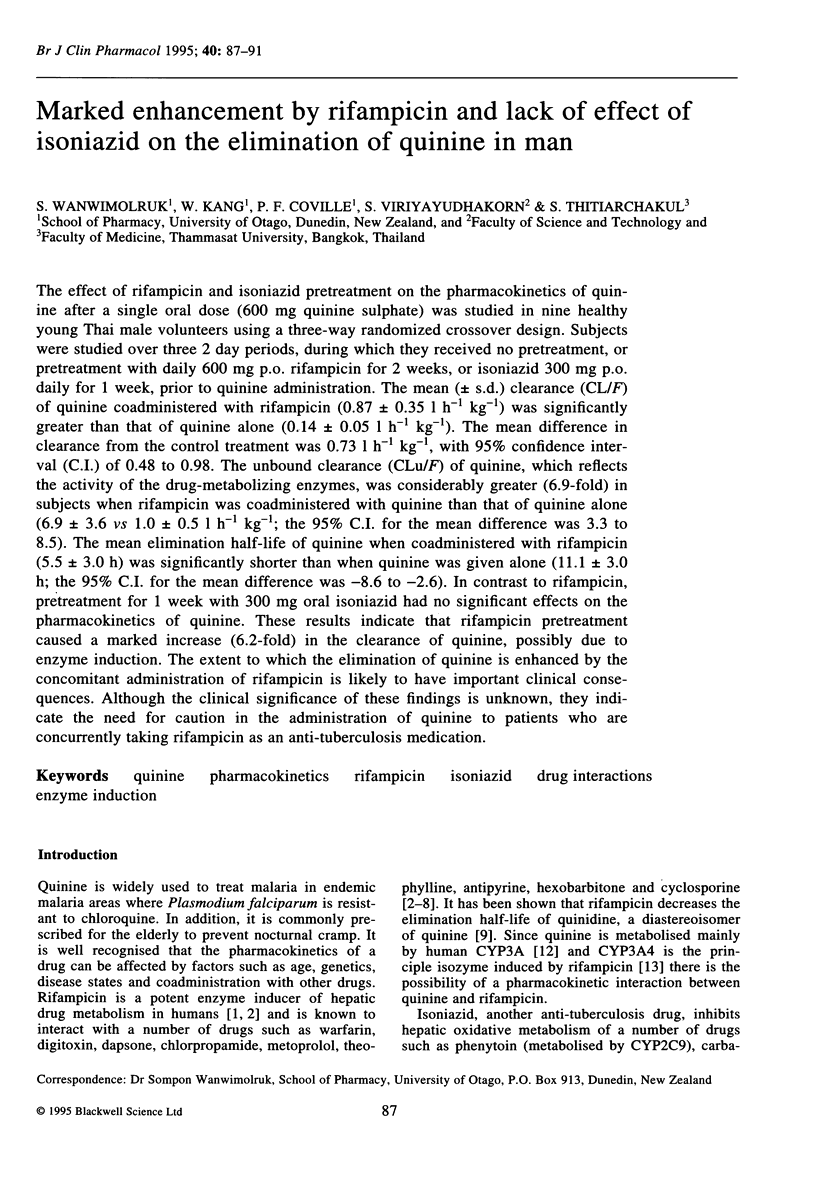
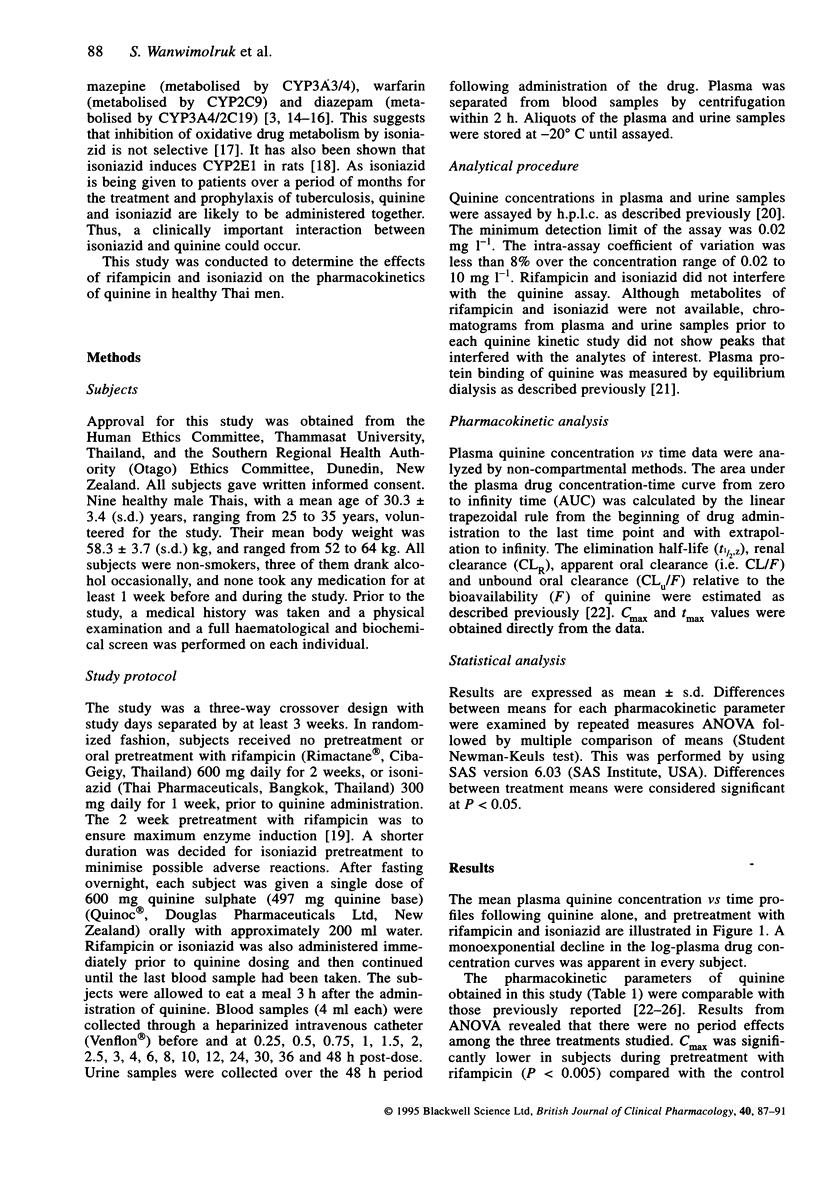
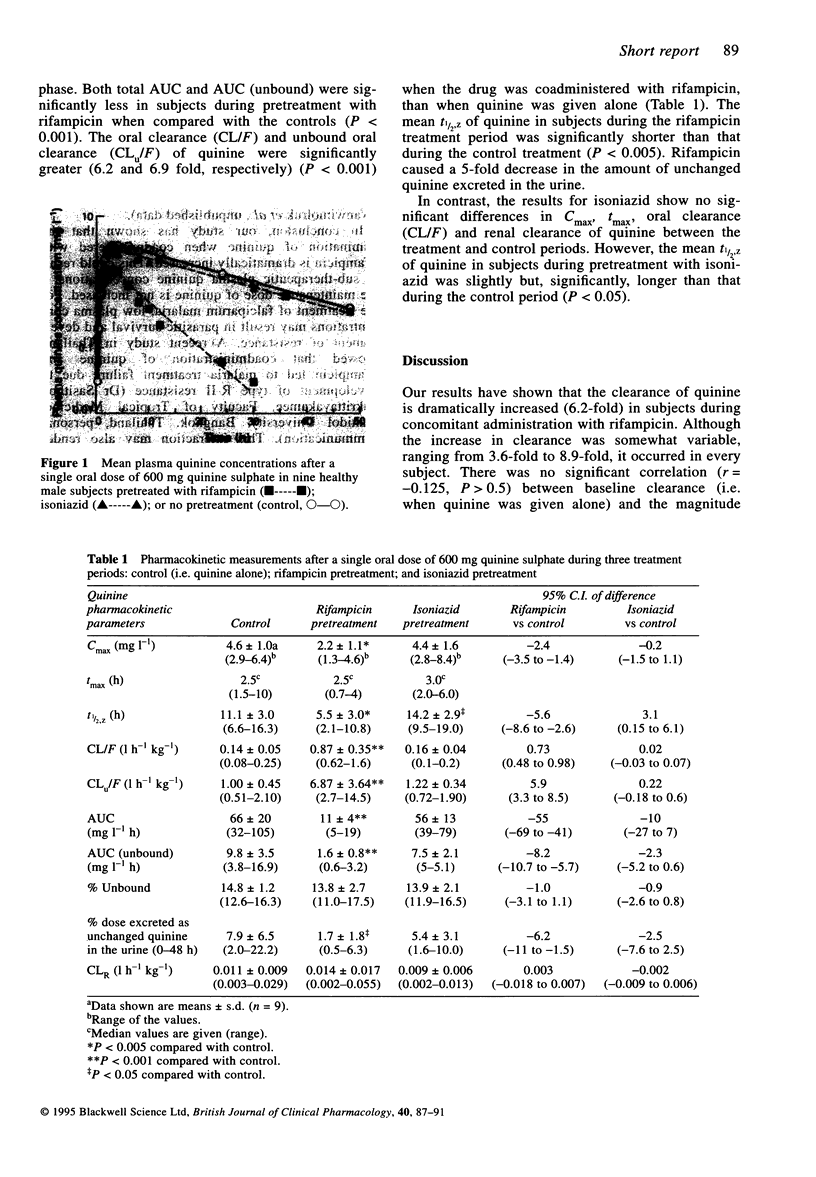
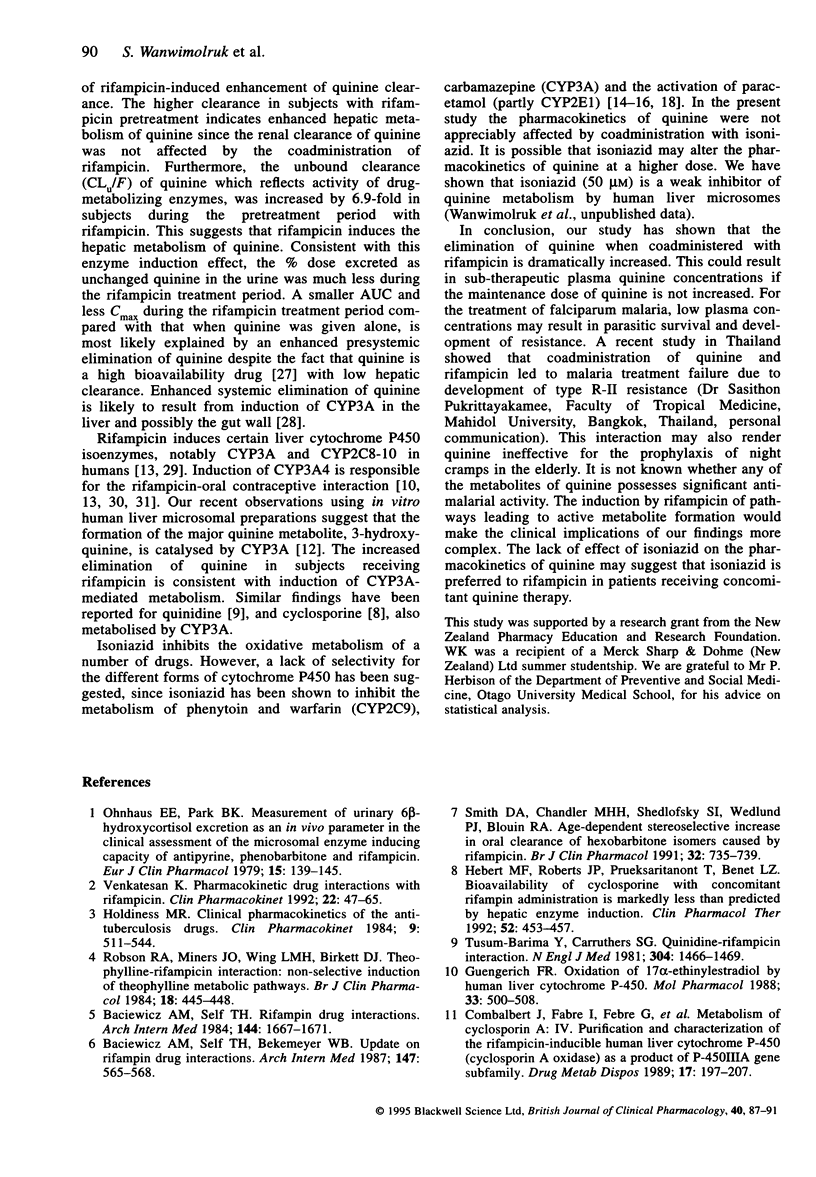
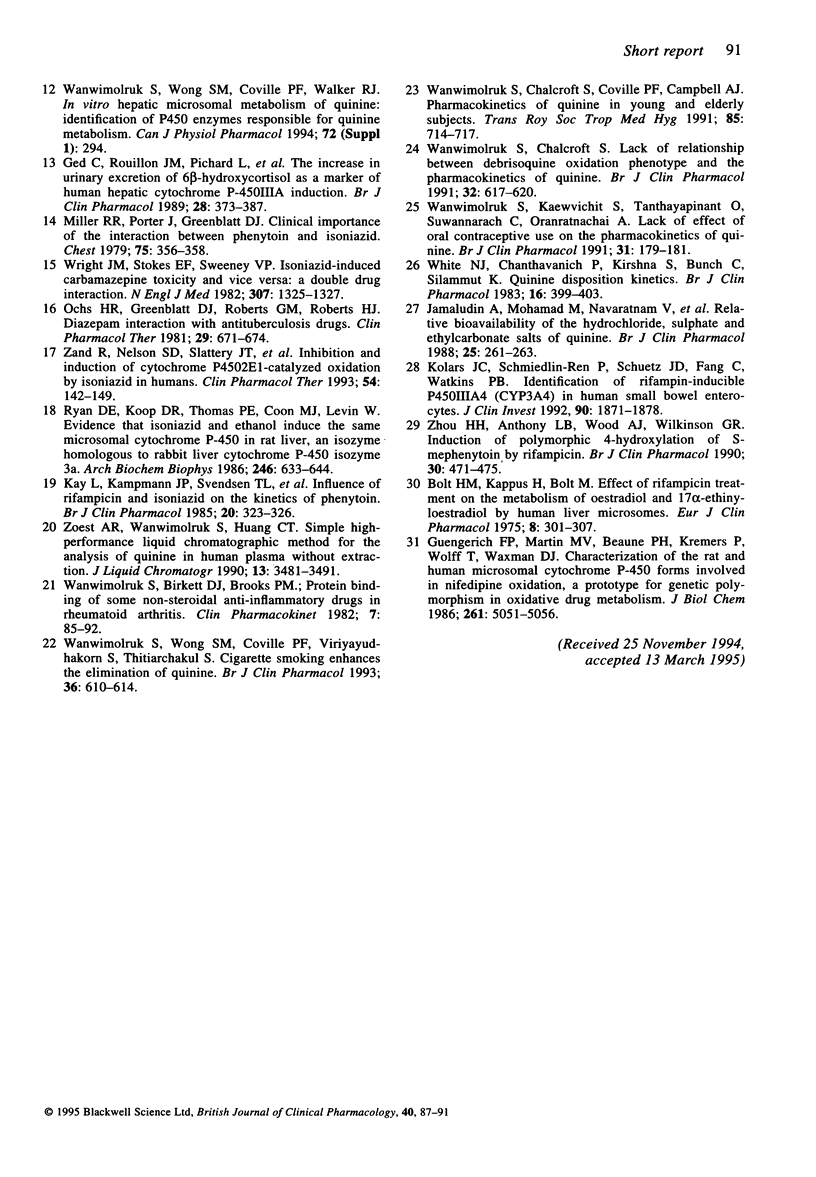
Selected References
These references are in PubMed. This may not be the complete list of references from this article.
- Baciewicz A. M., Self T. H., Bekemeyer W. B. Update on rifampin drug interactions. Arch Intern Med. 1987 Mar;147(3):565–568. [PubMed] [Google Scholar]
- Baciewicz A. M., Self T. H. Rifampin drug interactions. Arch Intern Med. 1984 Aug;144(8):1667–1671. doi: 10.1001/archinte.144.8.1667. [DOI] [PubMed] [Google Scholar]
- Bolt H. M., Kappus H., Bolt M. Effect of rifampicin treatment on the metabolism of oestradiol and 17alpha-ethinyloestradiol by human liver microsomes. Eur J Clin Pharmacol. 1975 Jun 13;8(5):301–307. doi: 10.1007/BF00562654. [DOI] [PubMed] [Google Scholar]
- Combalbert J., Fabre I., Fabre G., Dalet I., Derancourt J., Cano J. P., Maurel P. Metabolism of cyclosporin A. IV. Purification and identification of the rifampicin-inducible human liver cytochrome P-450 (cyclosporin A oxidase) as a product of P450IIIA gene subfamily. Drug Metab Dispos. 1989 Mar-Apr;17(2):197–207. [PubMed] [Google Scholar]
- Ged C., Rouillon J. M., Pichard L., Combalbert J., Bressot N., Bories P., Michel H., Beaune P., Maurel P. The increase in urinary excretion of 6 beta-hydroxycortisol as a marker of human hepatic cytochrome P450IIIA induction. Br J Clin Pharmacol. 1989 Oct;28(4):373–387. doi: 10.1111/j.1365-2125.1989.tb03516.x. [DOI] [PMC free article] [PubMed] [Google Scholar]
- Guengerich F. P., Martin M. V., Beaune P. H., Kremers P., Wolff T., Waxman D. J. Characterization of rat and human liver microsomal cytochrome P-450 forms involved in nifedipine oxidation, a prototype for genetic polymorphism in oxidative drug metabolism. J Biol Chem. 1986 Apr 15;261(11):5051–5060. [PubMed] [Google Scholar]
- Guengerich F. P. Oxidation of 17 alpha-ethynylestradiol by human liver cytochrome P-450. Mol Pharmacol. 1988 May;33(5):500–508. [PubMed] [Google Scholar]
- Hebert M. F., Roberts J. P., Prueksaritanont T., Benet L. Z. Bioavailability of cyclosporine with concomitant rifampin administration is markedly less than predicted by hepatic enzyme induction. Clin Pharmacol Ther. 1992 Nov;52(5):453–457. doi: 10.1038/clpt.1992.171. [DOI] [PubMed] [Google Scholar]
- Holdiness M. R. Clinical pharmacokinetics of the antituberculosis drugs. Clin Pharmacokinet. 1984 Nov-Dec;9(6):511–544. doi: 10.2165/00003088-198409060-00003. [DOI] [PubMed] [Google Scholar]
- Jamaludin A., Mohamad M., Navaratnam V., Selliah K., Tan S. C., Wernsdorfer W. H., Yuen K. H. Relative bioavailability of the hydrochloride, sulphate and ethyl carbonate salts of quinine. Br J Clin Pharmacol. 1988 Feb;25(2):261–263. doi: 10.1111/j.1365-2125.1988.tb03299.x. [DOI] [PMC free article] [PubMed] [Google Scholar]
- Kay L., Kampmann J. P., Svendsen T. L., Vergman B., Hansen J. E., Skovsted L., Kristensen M. Influence of rifampicin and isoniazid on the kinetics of phenytoin. Br J Clin Pharmacol. 1985 Oct;20(4):323–326. doi: 10.1111/j.1365-2125.1985.tb05071.x. [DOI] [PMC free article] [PubMed] [Google Scholar]
- Kolars J. C., Schmiedlin-Ren P., Schuetz J. D., Fang C., Watkins P. B. Identification of rifampin-inducible P450IIIA4 (CYP3A4) in human small bowel enterocytes. J Clin Invest. 1992 Nov;90(5):1871–1878. doi: 10.1172/JCI116064. [DOI] [PMC free article] [PubMed] [Google Scholar]
- Miller R. R., Porter J., Greenblatt D. J. Clinical importance of the interaction of phenytoin and isoniazid: a report from the Boston Collaborative Drug Surveillance Program. Chest. 1979 Mar;75(3):356–358. doi: 10.1378/chest.75.3.356. [DOI] [PubMed] [Google Scholar]
- Ochs H. R., Greenblatt D. J., Roberts G. M., Dengler H. J. Diazepam interaction with antituberculosis drugs. Clin Pharmacol Ther. 1981 May;29(5):671–678. doi: 10.1038/clpt.1981.94. [DOI] [PubMed] [Google Scholar]
- Ohnhaus E. E., Park B. K. Measurement of urinary 6-beta-hydroxycortisol excretion as an in vivo parameter in the clinical assessment of the microsomal enzyme-inducing capacity of antipyrine, phenobarbitone and rifampicin. Eur J Clin Pharmacol. 1979 Mar 26;15(2):139–145. doi: 10.1007/BF00609878. [DOI] [PubMed] [Google Scholar]
- Robson R. A., Miners J. O., Wing L. M., Birkett D. J. Theophylline-rifampicin interaction: non-selective induction of theophylline metabolic pathways. Br J Clin Pharmacol. 1984 Sep;18(3):445–448. doi: 10.1111/j.1365-2125.1984.tb02487.x. [DOI] [PMC free article] [PubMed] [Google Scholar]
- Ryan D. E., Koop D. R., Thomas P. E., Coon M. J., Levin W. Evidence that isoniazid and ethanol induce the same microsomal cytochrome P-450 in rat liver, an isozyme homologous to rabbit liver cytochrome P-450 isozyme 3a. Arch Biochem Biophys. 1986 May 1;246(2):633–644. doi: 10.1016/0003-9861(86)90319-x. [DOI] [PubMed] [Google Scholar]
- Smith D. A., Chandler M. H., Shedlofsky S. I., Wedlund P. J., Blouin R. A. Age-dependent stereoselective increase in the oral clearance of hexobarbitone isomers caused by rifampicin. Br J Clin Pharmacol. 1991 Dec;32(6):735–739. [PMC free article] [PubMed] [Google Scholar]
- Twum-Barima Y., Carruthers S. G. Quinidine-rifampin interaction. N Engl J Med. 1981 Jun 11;304(24):1466–1469. doi: 10.1056/NEJM198106113042405. [DOI] [PubMed] [Google Scholar]
- Venkatesan K. Pharmacokinetic drug interactions with rifampicin. Clin Pharmacokinet. 1992 Jan;22(1):47–65. doi: 10.2165/00003088-199222010-00005. [DOI] [PubMed] [Google Scholar]
- Wanwimolruk S., Birkett D. J., Brooks P. M. Protein binding of some non-steroidal anti-inflammatory drugs in rheumatoid arthritis. Clin Pharmacokinet. 1982 Jan-Feb;7(1):85–92. doi: 10.2165/00003088-198207010-00005. [DOI] [PubMed] [Google Scholar]
- Wanwimolruk S., Chalcroft S., Coville P. F., Campbell A. J. Pharmacokinetics of quinine in young and elderly subjects. Trans R Soc Trop Med Hyg. 1991 Nov-Dec;85(6):714–717. doi: 10.1016/0035-9203(91)90423-v. [DOI] [PubMed] [Google Scholar]
- Wanwimolruk S., Chalcroft S. Lack of relationship between debrisoquine oxidation phenotype and the pharmacokinetics of quinine. Br J Clin Pharmacol. 1991 Nov;32(5):617–620. doi: 10.1111/j.1365-2125.1991.tb03961.x. [DOI] [PMC free article] [PubMed] [Google Scholar]
- Wanwimolruk S., Kaewvichit S., Tanthayaphinant O., Suwannarach C., Oranratnachai A. Lack of effect of oral contraceptive use on the pharmacokinetics of quinine. Br J Clin Pharmacol. 1991 Feb;31(2):179–181. doi: 10.1111/j.1365-2125.1991.tb05509.x. [DOI] [PMC free article] [PubMed] [Google Scholar]
- Wanwimolruk S., Wong S. M., Coville P. F., Viriyayudhakorn S., Thitiarchakul S. Cigarette smoking enhances the elimination of quinine. Br J Clin Pharmacol. 1993 Dec;36(6):610–614. doi: 10.1111/j.1365-2125.1993.tb00424.x. [DOI] [PMC free article] [PubMed] [Google Scholar]
- White N. J., Chanthavanich P., Krishna S., Bunch C., Silamut K. Quinine disposition kinetics. Br J Clin Pharmacol. 1983 Oct;16(4):399–403. doi: 10.1111/j.1365-2125.1983.tb02184.x. [DOI] [PMC free article] [PubMed] [Google Scholar]
- Wright J. M., Stokes E. F., Sweeney V. P. Isoniazid-induced carbamazepine toxicity and vice versa: a double drug interaction. N Engl J Med. 1982 Nov 18;307(21):1325–1327. doi: 10.1056/NEJM198211183072107. [DOI] [PubMed] [Google Scholar]
- Zand R., Nelson S. D., Slattery J. T., Thummel K. E., Kalhorn T. F., Adams S. P., Wright J. M. Inhibition and induction of cytochrome P4502E1-catalyzed oxidation by isoniazid in humans. Clin Pharmacol Ther. 1993 Aug;54(2):142–149. doi: 10.1038/clpt.1993.125. [DOI] [PubMed] [Google Scholar]
- Zhou H. H., Anthony L. B., Wood A. J., Wilkinson G. R. Induction of polymorphic 4'-hydroxylation of S-mephenytoin by rifampicin. Br J Clin Pharmacol. 1990 Sep;30(3):471–475. doi: 10.1111/j.1365-2125.1990.tb03799.x. [DOI] [PMC free article] [PubMed] [Google Scholar]


